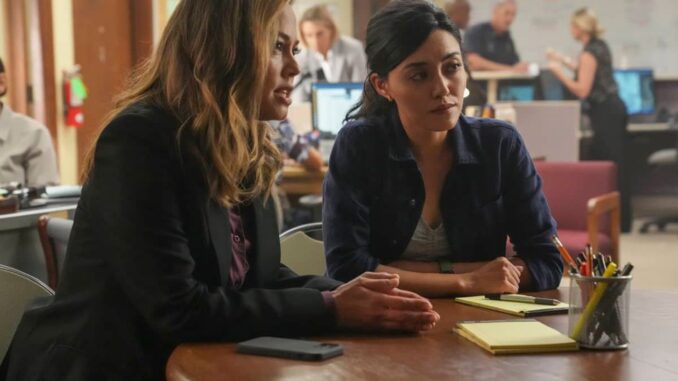
Many fans have been lamenting the cancelled spinoff police procedural show and recently a fan went X formerly Twitter to discuss it. They specifically tweeted about how they can’t get themselves to watch the new CBS spinoff show, NCIS: Origins with NCIS Hawai’i gone. Since NCIS Hawai’i was cancelled, NCIS: Origins has taken its time slot this fall with new episodes airing after the original NCIS on Monday nights.
The fan wrote: “Middle of the night I can’t sleep randomness… I will never watch NCIS: Origins because they canceled the popular & amazing NCIS: Hawaii, which had a woman lead, & diversity: Black, Asian, LGBTQ & Samoan characters as main cast And replaced it with the most white bread show. NCIS: Hawaiʻi.”
The NCIS franchise has long been a staple of American television, captivating audiences with its compelling characters and intricate storylines. However, recent decisions by CBS have left fans reeling and voicing their discontent. The cancellation of the beloved series NCIS: Hawai’i has sparked a wave of protests, with many fans vowing to boycott the upcoming spinoff, NCIS: Origins. This article delves into the reasons behind this backlash and examines the potential implications for the NCIS universe.
The Rise and Fall of NCIS: Hawai’i
NCIS: Hawai’i premiered in 2021, introducing viewers to Special Agent Jane Tennant, portrayed by Vanessa Lachey. The series was lauded for its diverse cast and unique setting, offering a fresh perspective within the NCIS franchise. Despite its popularity and positive reception, CBS announced the show’s cancellation after just three seasons, citing financial considerations and scheduling conflicts as primary reasons.
The abrupt cancellation left fans disheartened, especially given the show’s cliffhanger finale. The decision to end the series without resolution has been a point of contention among viewers, many of whom felt the show was unjustly cut short.
The Announcement of NCIS: Origins
In 2024, CBS introduced NCIS: Origins, a prequel focusing on a young Leroy Jethro Gibbs, the iconic character portrayed by Mark Harmon in the original NCIS series. The show aims to explore Gibbs’ early years as a probationary NIS agent, delving into his formative experiences and the events that shaped him into the seasoned investigator fans came to know and love.
Despite the potential appeal of revisiting a beloved character’s backstory, the announcement of NCIS: Origins was met with mixed reactions. Many fans questioned the timing of the new series, especially in light of the recent cancellation of NCIS: Hawai’i.
The Backlash: Fans Organize Boycott
The unveiling of NCIS: Origins coincided with the airing of the NCIS: Hawai’i finale, leading to a surge of online protests. Fans took to social media platforms, particularly X (formerly Twitter), to express their dissatisfaction. Hashtags such as #SaveNCISHawaii and #BoycottNCISOrigins trended as viewers voiced their frustrations over what they perceived as a corporate decision that disregarded their loyalty and investment in the Hawai’i series.
One fan expressed, “This is why NCIS: Hawai’i was cancelled… budget for this show & NCIS Origins” . Another added, “Let’s skip the NCIS: Origins and let’s get more episodes of NCIS: Hawai’i” . These sentiments reflect a broader sense of betrayal among the fanbase.
The Impact on NCIS: Origins
Despite its connection to the established NCIS universe, NCIS: Origins has struggled to gain traction. The series’ premiere faced stiff competition, and its ratings have been underwhelming. Some industry analysts suggest that the negative publicity surrounding the cancellation of NCIS: Hawai’i may have contributed to the lukewarm reception of the new spinoff .
Furthermore, the decision to place NCIS: Origins in the time slot previously occupied by NCIS: Hawai’i has been perceived by some as a direct replacement, further alienating the show’s dedicated viewers .
CBS’s Response and Future Prospects
In response to the backlash, CBS has remained largely silent, offering few public statements addressing the controversy. The network’s focus appears to be on promoting its new series, including NCIS: Origins, rather than engaging with the concerns of its audience.
Looking ahead, the future of NCIS: Origins remains uncertain. While the series has been renewed for a second season, its long-term viability will depend on its ability to attract and retain viewers. The ongoing boycott and the negative sentiment surrounding the cancellation of NCIS: Hawai’i could pose significant challenges for the show’s success.

Conclusion
The controversy surrounding the cancellation of NCIS: Hawai’i and the subsequent launch of NCIS: Origins highlights the delicate balance networks must maintain between creative decisions and audience expectations. While NCIS: Origins offers a fresh perspective on a beloved character, its success may be hindered by the lingering dissatisfaction of fans who feel their favorite series was unjustly canceled.
As the NCIS franchise continues to evolve, it will be crucial for CBS to consider the voices of its dedicated viewers. Ignoring fan sentiment can lead to backlash, as evidenced by the current situation. Only time will tell if NCIS: Origins can overcome these challenges and carve out its own place in the NCIS universe.
FAQs
1. Why was NCIS: Hawai’i canceled?
CBS cited financial considerations and scheduling conflicts as the primary reasons for canceling NCIS: Hawai’i after three seasons.
2. What is NCIS: Origins about?
NCIS: Origins is a prequel series that explores the early years of Leroy Jethro Gibbs as a probationary NIS agent, delving into the events that shaped his character.
3. How have fans reacted to the cancellation of NCIS: Hawai’i?
Many fans have expressed their dissatisfaction through online protests and boycotts, feeling that the cancellation was unjust and that their loyalty to the series was disregarded.
4. Has NCIS: Origins been successful?
While the series has been renewed for a second season, its ratings have been underwhelming, and it faces challenges in attracting and retaining viewers.
5. What can CBS do to address fan concerns?
Engaging with the fanbase, acknowledging their concerns, and considering their feedback in future decisions could help CBS rebuild trust and loyalty among viewers.